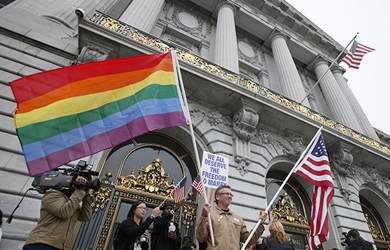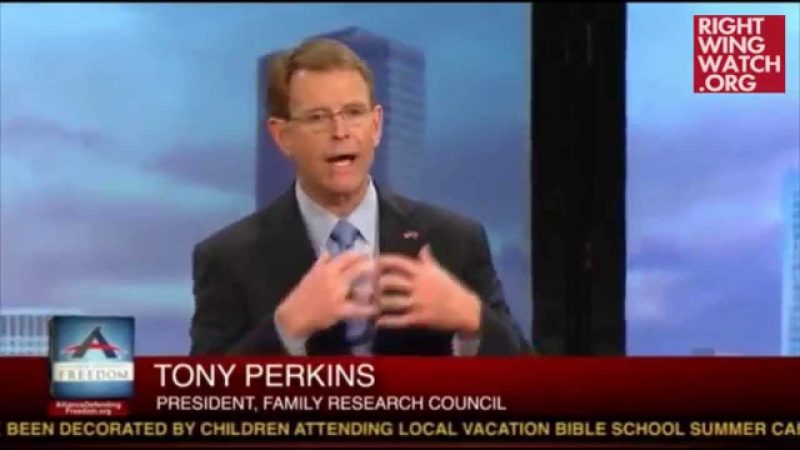Yesterday, a leader of the Religious Right declared that Episcopal Church should no longer be considered Christian because the church backs equality for gays and lesbians. Now, the Episcopal Church is under attack from the Institute on Religion and Democracy, a far-right organization with a history of vilifying mainline denominations, as a result of the church’s support for environmentalism and action to combat climate change. Writing for David Horowitz’s far-right Front Page Magazine, IRD president Mark Tooley assails Episcopalians for working to promote environmental protection and assistance for developing countries, stating that for Episcopalians, “‘the Earth’ displaces a higher authority whom believers better merits a ‘relationship.’”
Tooley’s criticism of the Episcopal Church reflects the growth of climate change denialism among Religious Right leaders. The Cornwall Alliance, joined by representatives of groups including Focus on the Family, Concerned Women for America, the Family Research Council, and the American Family Association, recently announced a campaign against “The Green Dragon.” Members of the campaign attacked environmentalists’ “lust for political power” and accused them of “pointing people away from God,” “believing and promoting exaggerations and myths,” and “scaring little children to achieve [their] political ends,” among other charges.
Similarly, Tooley recycles bogus “Climategate” accusations and claims that the Episcopal Church’s efforts to protect the environment and work against climate change actually show that Episcopalians are “fear-mongers” who are replacing “the concept of divine judgment with apocalyptic environmental scare scenarios.” Tooley writes:
These particular Episcopal global warming fear-mongers came from the north and the south and the east and the west, as though in fulfillment of the biblical end times. Or more specifically, they came from South America, Central America, the Caribbean, and the U.S., including the bishops of California, who no doubt would be piously loath to miss any global warming guilt-fest.
“We have lost a sense of connection with the world, and have become dominators rather than ‘good gardeners;’ over-developed countries have given themselves over to the sin of consumerism,” a fretful statement by the group intoned. “This sin, as sin always does, has clouded and distorted all our relationships: between people, with the Earth, and with our creator God.” The Religious Left sometimes, a little pantheistically, likes to speak of “relationships” with inanimate objects, like “the Earth.” For them, sometimes “the Earth” displaces a higher authority whom believers better merits a “relationship.”
The Episcopal group met around the theme of “climate justice” December 7 – 10, 2010 in San Pedro de Macorís, Dominican Republic at the Bishop Kellogg Retreat Center, intentionally overlapping with the United Nations’ climate change meeting in Mexico. For the Religious Left, the UN carries almost transcendent authority, though perhaps not so much as “the Earth.”
…
The Anglican global warming group also committed to “recruit and empower a core of missionaries from the global south” to come to the United States, “in a ministry of accompaniment and consciousness-raising about the effects of climate change.” Traditional Christians understand missionaries as proclaimers of the Gospel. But the Religious Left has mostly reinterpreted redemption to mean conformity to its own political agenda. Its “missionaries” declare the Good News of reduced political and economic liberty in service to statism and international regulation.
…
According to the Episcopal News Service, about 30 attended the Anglican global warming jamboree, including seminarians from Berkeley Divinity School, Yale Divinity School and several Latin American institutions. No doubt all were suitably enraged when told about repeated instances of “climate injustice” such as the consumption of resources “at such a frantic rate that we are stealing from the future generations of the Earth.” Participants complained about rising water levels “displacing entire island populations,” deforestation, the “decimation” of indigenous peoples, and degraded rivers affected by toxic runoff and human waste. All are the sinister products of global warming, the organizers insisted, having largely replaced the concept of divine judgment with apocalyptic environmental scare scenarios.
“Our hope is in God … who does not forget the covenants made with the Earth, and our hope is in our capacity to love,” the Anglican/Episcopal statement decreed, without citing a Scriptural reference for where the Almighty ever made agreements with “the Earth.” But as devoted servants of “the Earth,” the Episcopal Church segment of the Religious Left no doubt will persevere in its increasingly dubious global warming crusade, perhaps relating to a lonely Noah when he built the ark, and no doubt hoping for eventual vindication.








